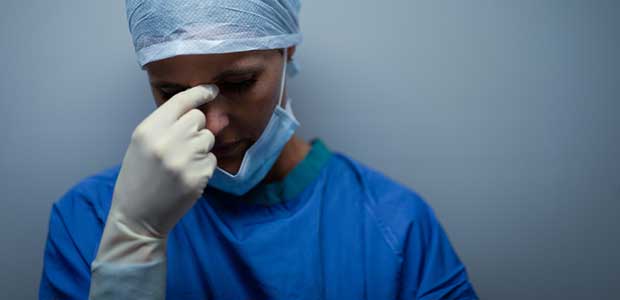
Page 3 of 2
Healthcare Workers Suffer from PTSD and Burnout During COVID-19
Many healthcare workers have found this pandemic especially difficult for their mental health, and with good reason. It’s no question that the healthcare industry is emotionally draining, but COVID-19 adds a whole new wrinkle to trauma, grief and PTSD for these workers.
One New York Times article recounts the stories of workers who care for COVID-19 patients. Bridget Ryan, who helped one COVID patient, describes just how difficult it is.
The patient, a 75-year-old man, was dying in the hospital. No family members were allowed in the room with him—only one female nurse. He was not even Ryan’s patient, but everyone else was slammed.
Ryan wore full protective gear, dimmed the lights, turned on soothing music, freshened his pillows, held his hand, spoke softly to him and held an iPad close to him so he could hear the voice of a grief-stricken family relative over Skype.
After he died, Ryan wept in a hallway.
A few days later, he privately messaged Dr. Heather Farley, who directs a comprehensive staff support program at Christiana Hospital in Newark, Delaware. I’m not the kind of nurse that can act like I’m fine and that something sad didn’t just happen,” she wrote.
Healthcare workers are the superheroes of our age. But they are emotional beings as well, and their jobs still face stress, death and trauma every day—despite the flood of community thank-you notes and balcony shouts and delivered treats.
As the article explains, healthcare workers are incredibly susceptible to post-traumatic stress and emotional burnout, mental health experts say. A recent study of US physicians found 46 percent of the respondents had at least one symptom of burnout. Since the start of the pandemic, though, that number could be much higher.
Unfortunately, suicide rates among medical workers has also been high. While researchers are still working to pinpoint some of the clear causes of these rates, the tragedies have served as a devastating wake-up call about the mental health of healthcare workers.
Last week, the World Health Organization issued a report about the pandemic’s impact on mental health, and it highlighted the fact that healthcare workers were extremely vulnerable. Recent studies of medical workers in China, Canada and Italy who treated COVID-19 patients showed soaring rates of anxiety, depression and insomnia.
“I have nightmares that I won’t have my P.P.E. I worry about my patients, my co-workers, my family, myself. I can’t turn my brain off,” said Christina Burke, an I.C.U. nurse at Christiana Hospital, Newark, Delaware.
As the issue has become more obvious, therapists who specialize in trauma are offering free sessions to medical workers and emergency responders worldwide. According to the article, New York City has teamed with the Defense Department to train 1,000 counselors to address the widespread stress, which is similar to that of combat.
The other part to the puzzle, though, is the fact that medical workers are often self-reliant and may not always ask for help.
“Physicians are often very self-reliant and may not easily ask for help. In this time of crisis, with high workload and many uncertainties, this trait can add to the load that they carry internally,” said Dr. Chantal Brazeau, a psychiatrist at the Rutgers New Jersey Medical School.
Systems like “check you, check two” (where each staff member checks in on themselves and two colleagues a day) are proven to be helpful.
But it’s important to remember that healthcare workers in hospitals are not the only people dealing with PTSD and emotional stress as a direct result to the virus. Other first responders, paramedics, firefighters and law enforcement deal with these strains, too.
Like healthcare workers, these other frontline workers struggle to leave the traumas of their jobs behind as they come home and go to sleep at night. Their jobs are demanding and emotionally draining; PPE and equipment is scarce; home lives are busy and restless because of stay-at-home orders; and tensions are high.
Many health experts agree that as the pandemic continues (or even begins to improve), healthcare workers’ mental health will continue to be an area of needed attention. The stress, anxiety and PTSD many workers face as a consequence of their jobs is a tragic reality for the healthcare system—but with encouragement, support and counseling, we can support those who are on the frontlines.